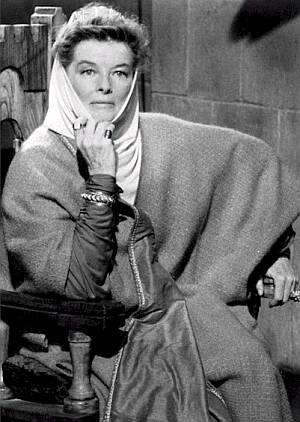 If Eleanor of Aquitaine is perhaps best known through the Oscar-winning portrayal of Katherine Hepburn (right) in The Lion in Winter, she was one of the richest and most powerful women of the Middle Ages in her own right. She was married twice, to the Kings of France and England, and she survived to see two sons also became monarchs. But Eleanor’s own life was both long – she lived into her eighties, remarkable for the era – and colourful.
If Eleanor of Aquitaine is perhaps best known through the Oscar-winning portrayal of Katherine Hepburn (right) in The Lion in Winter, she was one of the richest and most powerful women of the Middle Ages in her own right. She was married twice, to the Kings of France and England, and she survived to see two sons also became monarchs. But Eleanor’s own life was both long – she lived into her eighties, remarkable for the era – and colourful.
The first thirty years alone give ample material for a movie. After her father died when she was 15, she became heiress to the Duchy of Aquitaine, almost an independent nation in what is now Southwest France. This stretched from the Loire to the Pyrenees, so the phrase “independently wealthy” could have been coined specifically for her. She was educated, speaking Latin and knowing how to read, and enjoyed hunting and riding – ideal heiress material. To stave off any wars (or even abductions, a common inheritance-obtaining technique in those days), her father left a will saying she should marry Louis VII of France – this she did, and the crystal vase which she gave him as a wedding present (below, left), can still be seen to this day in the Louvre.
On Christmas Day, 1145, Louis announced his intention to go on a crusade to the Holy Land, and Eleanor decided to go with him. As part of the recruitment drive, it’s said that Eleanor turned up at Vézelay Cathedral, dressed like an Amazon, and galloped through the crowds on a white horse, urging them to join the crusade. It’s also recorded that on the trip she and her ladies in waiting wore armour and were armed for battle. Although it’s doubtful they did any actual fighting, there’s no need to get too worried about such a minor detail – after all, Hollywood rarely does!
I see this movie as a lighthearted action romp, a sort of Charlie’s Angels Go Medieval, rather than a serious historical piece. I imagine a scene where Louis prepares to go on Crusade, and gives Eleanor the parting gift she wants least; a chastity belt. She goes with the locksmith to a room to try it on, and the sounds of struggle emerge from the room. Louis starts to get worried and enters to find to his surprise the locksmith wearing the belt and Eleanor and two of her ladies-in-waiting standing over him. There is no alternative; they will have to go on the Crusade with him.
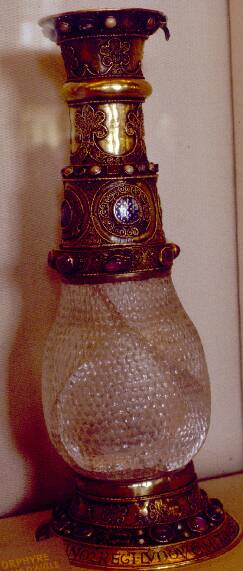
The crystal vase Eleanor gave to Louis as a wedding gift
While on crusade, I definitely think that Eleanor should get kidnapped and held for ransom. The King and his knights plan to rescue her but fear for her safety, so her two ladies go in first in disguise. The three of them now arm themselves and fight their way out to join their rescuers. I have no favourite for the role of Eleanor, as I am not as familiar with beautiful French actresses as I want to be, and there are no authenticated portraits from which to draw inspiration. But I rather like the idea of having Jessica Biel and Keira Knightley as the ladies-in-waiting.
Eleanor’s marriage to Louis would end when the pope annulled the marriage, in 1153. The reasons he gave were her inability to give Louis sons and their consanguinity, but there may well have been more to it than that. Gossip linked Eleanor with her uncle, Raymond of Poitiers, whom she met during the crusade, and also Geoffrey the Fair, Count of Anjou. It is historical fact she commented that being married to Louis was like being married to a monk, which makes it clear the Pope was right to call them incompatible.
Much to Louis’s horror, a mere six weeks after their divorce, she married Prince (soon to be King) Henry II of England [curiously, she was as close a relation to him as Louis. So much for consanguity.] She was thirty by this time and he was still a teenager, which I think would have shocked a lot of people – not least because as mentioned above, rumour also linked Eleanor to Henry’s father, Geoffrey! Regardless, she certainly had no trouble giving him sons: five, as well as three daughters.
Despite this, a major point of friction was Henry’s womanizing: in 1168, things had deteriorated to such an extent, Eleanor left, and set up her own court in Poitiers. Legend says at one point she also confronted one of Henry’s paramours, Rosalind Clifford, with a dagger in one hand and a cup of poison in the other, asking her to choose her death. Henry even took his son Richard’s fiancée as his mistress, which infuriated Eleanor; Richard is widely-believed to have been homosexual, so it is more difficult to judge his reaction. [Sometimes this does seem more like soap opera – or worse. Today on Ye Jerrye Springere Showe: “I’m King of England and I’m sleeping with my gay heir apparent’s girlfriend.”] However, it’s obvious Henry didn’t get on too well with any his offspring: when they came of age, his sons rebelled against him, with Eleanor’s support.
Anybody who wants to make a controversial historical drama might well consider doing the real Richard Coeur-de-lion story – he was French rather than English, so this is the version of his name that is preferred by many. His mother would also have a major supporting role, as there was plenty for her to do – though not immediately, for after her revolt failed, Eleanor was imprisoned for fifteen years. She was only freed when Henry died, soon after being defeated by the combined forces of Richard and King Philip II of France – this made Richard not only King of England but also ruler of a lot of France.
A touching scene in the movie would be Richard releasing Eleanor from her confinement. I can see Richard informing his mother on her release that he is in love. This is indeed a joyful day for her – right up to the time Richard introduces her to his lover; Philip of France. Oops. After this, the two Kings made joint preparations to go on the 3rd Crusade to free Jerusalem from the Moslems.
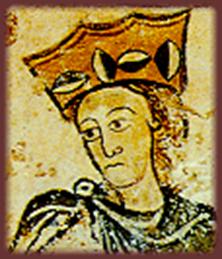 It was Eleanor who looked after things when he was gone; a contemporary writer, Ralph of Diceto, says: “He issued instructions to the princes of the realm, almost in the style of a general edict, that the queen’s word should be law in all matters.” This is significant, since of Richard’s ten year reign, only six months were actually spent in England. She did make one major overseas trip during this period, arranging for Richard to marry Berengaria of Navarre. But he wasn’t waiting around to get hitched to anyone – he was off to Palestine. It was up to Eleanor, now almost 70, to ride over the Pyrenees, collect the prospective bride from her home, and then travel with her through Spain, France and Italy to Sicily where Richard and his army were camped.
It was Eleanor who looked after things when he was gone; a contemporary writer, Ralph of Diceto, says: “He issued instructions to the princes of the realm, almost in the style of a general edict, that the queen’s word should be law in all matters.” This is significant, since of Richard’s ten year reign, only six months were actually spent in England. She did make one major overseas trip during this period, arranging for Richard to marry Berengaria of Navarre. But he wasn’t waiting around to get hitched to anyone – he was off to Palestine. It was up to Eleanor, now almost 70, to ride over the Pyrenees, collect the prospective bride from her home, and then travel with her through Spain, France and Italy to Sicily where Richard and his army were camped.
The dowry she brought was useful; her country bordered on his land in France, and by marrying her, Richard would make his Mum happy. I think the film can show that Eleanor can be deceitful at this point. She is desperate for her favourite son to produce an heir for the family empire, and she doesn’t care who gets hurt in the process. The scene of the young bride finding out that she has been conned, and that her new husband doesn’t want to sleep with her, could be quite moving.
Regardless, Berengaria still travelled with Richard and his army to Cyprus, where they married and she was crowned Queen of England – a country she was destined never to visit. Unsurprisingly, the marriage had no chance. Richard ignored his new bride and set about conquering Palestine: he took command of the Crusader army that had been besieging Acre for two years, and took it in a matter of weeks. He then leads the army towards Jerusalem, defeating the Arabs under their commander Saladin on the way at the battle of Arsuf.

Eleanor’s tomb in Fontevraud Abbey
This particular battle would make an interesting scene as it demonstrates well Richard’s tactical skill. Other scenes would have to include his split with Philip, who packed up and went home, and his humiliation of Duke Leopold of Austria; both these incidents foreshadow later events. The Crusaders were unable to advance all the way to Jerusalem so a truce was signed between the two sides.
About this time Richard got bad news from home. His brother John was trying to take over. Eleanor was looking after his interests as best she could, but Richard felt he had to get back, fast. It was on his return journey that he was shipwrecked, and while travelling overland across Europe was captured, imprisoned and put up for ransom. All this is worth being covered in the movie, as is the scene where Prince John hears of it.
This would be a classic “good news, bad news” story, in which the messenger doesn’t know which is which. On being told that Richard is still alive, John is furious; he had hoped his brother had been killed in the shipwreck. He soon cheers up however when he hears the “bad” news: Duke Leopold, no ally of Richard, has captured the king. John has no intention of paying up: he’s quite content if his brother stays there forever and keeps Richard’s location a secret so that nobody else – such as Eleanor – finds out. He also offered the kidnappers an “anti-ransom” to make sure Richard remained captive.
Eleanor did much to raise the 150,000 marks – twice the annual income of the English crown – demanded, but still had the problem of finding her son. Enter the minstrel Blondel, who puts his own life at risk by going round the castles of Austria singing a (love?) song that he wrote with Richard. They used to sing it together as a duet so when the minstrel hears the King singing his part, he knows he has the right castle. This would make a dramatic scene, as would giving the news to Eleanor. With proof that her son is still alive and his location she was able to pay the ransom and obtain Richard’s freedom. [He visited England briefly, dealt with John, put somebody competent in charge, and was soon off again to Normandy where he was killed laying siege to a castle a few years later.]
This film could also explore the whole morality of the Crusades. The relevance of a Christian/Moslem religious war to a 21st-century audience, familiar with the rhetoric of terror, should be obvious. The character of Saladin is also worthy of development. He united his people, was a brave and skilful general and even the Christians had a lot of respect for him: a simplistic portrayal as “the bad guy” would be totally wrong. When Richard and Philip get to the Holy Land, their falling out could be looked at – and whether Richard’s minstrel Blondel played a part. Phillip left the Crusade early complaining of “sickness” – yet back in France, was healthy enough to set about conquering Richard’s territory. There must be more to the story than this, but historians seem a little shy about telling it. I wonder why?
Eleanor, meanwhile, lived on: advising John, who gained the throne legimately on the death of Richard, and travelling around Europe, matchmaking for her many grandchildren. For example, she married her 13-year old granddaughter Blanche of Castile to Louis VIII of France – the grandson of her first husband, Louis VII! [That’s another Jerry Springer episode, right there…] She died in 1204 and is buried in Fontevraud Abbey, near both her husband Henry and her son Richard, with her position among the most fascinating and adventurous of medieval action heroines assured.





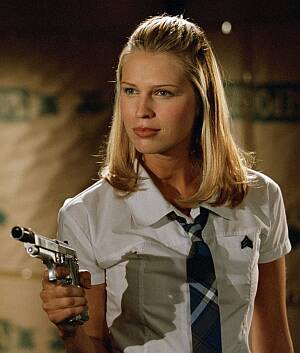 As Kim Possible proves, there’s certainly scope for a high-school action heroine who has to save the world from evil. Unfortunately, here, the potential largely gurgles down the plughole, in favour of a smug, self-satisfied romantic comedy, that manages to be as bland as a film about teenage lesbians could be. Amy Bradshaw (Foster) gets a perfect score on the test hidden within the SAT, and is recruited into a spy academy; there, with her classmates (Good, Ritchie and the always amusing Devon Aoki), she carries out secret missions, wears plaid skirts and agonises over her relationship with her boyfriend.
As Kim Possible proves, there’s certainly scope for a high-school action heroine who has to save the world from evil. Unfortunately, here, the potential largely gurgles down the plughole, in favour of a smug, self-satisfied romantic comedy, that manages to be as bland as a film about teenage lesbians could be. Amy Bradshaw (Foster) gets a perfect score on the test hidden within the SAT, and is recruited into a spy academy; there, with her classmates (Good, Ritchie and the always amusing Devon Aoki), she carries out secret missions, wears plaid skirts and agonises over her relationship with her boyfriend. The action isn’t too bad initially, with a sprightly shootout in a restaurant. However, that’s your lot, save the “daring” lesbian angle. Though, being mainstream cinema, it’s just a couple of clothes-on kisses, and bad, unconvincing romance is no fun, regardless of a character’s orientation. This aspect is so po-faced and politically correct – it is, clearly, supposed to be taken Very Seriously – that proceedings come to a grinding halt, while what appears to be the director’s iPod on shuffle plays as a witless soundtrack. Look! An Erasure song! How appropriate! ‘Cos, y’know, they’re
The action isn’t too bad initially, with a sprightly shootout in a restaurant. However, that’s your lot, save the “daring” lesbian angle. Though, being mainstream cinema, it’s just a couple of clothes-on kisses, and bad, unconvincing romance is no fun, regardless of a character’s orientation. This aspect is so po-faced and politically correct – it is, clearly, supposed to be taken Very Seriously – that proceedings come to a grinding halt, while what appears to be the director’s iPod on shuffle plays as a witless soundtrack. Look! An Erasure song! How appropriate! ‘Cos, y’know, they’re 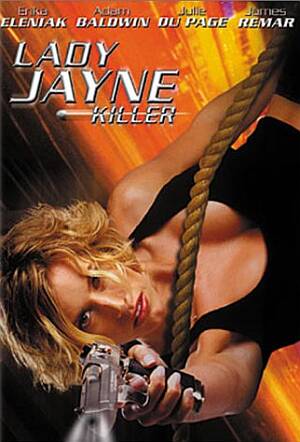 Memo to self: don’t tell your wife the star of a film was in Playboy. Chris’s interest, already somewhat on thin ice, evaporated entirely, pretty much the moment I made that mistake, and I almost had to handcuff her to the bed to prevent a sudden trip to the supermarket. The concept here is kinda cool: Mom Emily (Eleniak) vs. anti-Mom Jayne (du Page). The latter is a hitwoman for the Mob, with 20 kills to her credit when she decides to abscond with a million in cash. She ends up hitching a ride beside Emily and her 16-year old son Kerry (Lelliot) on their way to San Antonio, with the former owners of the money in hot pursuit. And the cops. And the FBI. Then Kerry – when not fantasizing about Eleniak in the shower [cue Chris’s neo-departure!] – decides to solves Mom’s financial problems with thievery of his own.
Memo to self: don’t tell your wife the star of a film was in Playboy. Chris’s interest, already somewhat on thin ice, evaporated entirely, pretty much the moment I made that mistake, and I almost had to handcuff her to the bed to prevent a sudden trip to the supermarket. The concept here is kinda cool: Mom Emily (Eleniak) vs. anti-Mom Jayne (du Page). The latter is a hitwoman for the Mob, with 20 kills to her credit when she decides to abscond with a million in cash. She ends up hitching a ride beside Emily and her 16-year old son Kerry (Lelliot) on their way to San Antonio, with the former owners of the money in hot pursuit. And the cops. And the FBI. Then Kerry – when not fantasizing about Eleniak in the shower [cue Chris’s neo-departure!] – decides to solves Mom’s financial problems with thievery of his own.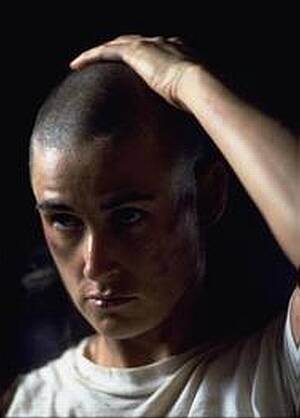 The opening hour of this must be great entertainment for sadists, watching Demi Moore get pummelled, ground-down, chewed-up and beaten into a bloody pulp by the war machine, as part of Navy SEAL training. The first woman to go through it, she could open the door for others if she succeeds – which is exactly why the stops are pulled out to ensure she fails. While the most obvious face of this is Master Chief Urgayle (Mortensen – his character here would eat Aragorn for lunch), her political mentor Senator DeHaven (Bancroft) also finds the pressure coming down to pull the plug on this social experiment. But Jan…er, Jordan O’Neil (Moore), won’t give up at any cost, demanding absolutely equal treatment. Of course, after what seems like a 75-minute training montage, she wins the respect of her colleagues, overcoming the Senator’s intervention thanks to a peskily imperfect fax machine.
The opening hour of this must be great entertainment for sadists, watching Demi Moore get pummelled, ground-down, chewed-up and beaten into a bloody pulp by the war machine, as part of Navy SEAL training. The first woman to go through it, she could open the door for others if she succeeds – which is exactly why the stops are pulled out to ensure she fails. While the most obvious face of this is Master Chief Urgayle (Mortensen – his character here would eat Aragorn for lunch), her political mentor Senator DeHaven (Bancroft) also finds the pressure coming down to pull the plug on this social experiment. But Jan…er, Jordan O’Neil (Moore), won’t give up at any cost, demanding absolutely equal treatment. Of course, after what seems like a 75-minute training montage, she wins the respect of her colleagues, overcoming the Senator’s intervention thanks to a peskily imperfect fax machine. This SciFi Channel original movie is based on a comic-book series, but makes some radical changes to the storyline, though the basic idea is intact: a woman becomes immune to injury after the usual mysterious something happens to her [radioactive spider bite, barrel of toxic waste – the usual graphic novel contrivances, in other words]. In the comic, she was an undercover cop; here, she is a Special Forces soldier in Chechnya who is exposed to an experimental biological agent. Naturally, she subsequently finds herself much sought after, by both good and bad factions, since she’s the first to survive the treatment.
This SciFi Channel original movie is based on a comic-book series, but makes some radical changes to the storyline, though the basic idea is intact: a woman becomes immune to injury after the usual mysterious something happens to her [radioactive spider bite, barrel of toxic waste – the usual graphic novel contrivances, in other words]. In the comic, she was an undercover cop; here, she is a Special Forces soldier in Chechnya who is exposed to an experimental biological agent. Naturally, she subsequently finds herself much sought after, by both good and bad factions, since she’s the first to survive the treatment.